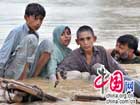| Videos | ? Latest |
|
? Feature | ? Sports | ? Your Videos |
Medical relief to mothers and kids in Pakistan

In the aftermath of the devastating floods that swept across Pakistan, women and children are facing perilous conditions.
Flood waters have left behind a trail of colossal destruction affecting more than 20 million people. Collapsed bridges and roads are hampering relief efforts and the worst affected areas are still inaccessible by road.
In Charsaddah district, the local high school is refuge to more than 500 displaced families. Nineteen year old Amina has taken refuge in the school with her family. She said: "Flood waters entered our home in the middle of the night. We ran to save our lives. We have lost our home. Nothing is left. Now my son is ill. He has diarrhoea and has lost a lot of weight."
Amina is four months pregnant and has come to the health center to get medical assistance for her son and herself.
The UNICEF supported health center and mobile health teams are providing life-saving vaccinations, checkups and essential medicines to avert maternal and child deaths.
The risk of outbreak of deadly diseases is high and women and children are the most vulnerable. The aim is to immunize all children under 5 year old age.
Health workers are providing vital information during health and hygiene sessions – how prevent water borne disease and special care during these dire conditions.
But the needs are as widespread as the destruction. Dr Fazale Akbar, Charsadda District Health Officer, said: "A huge population is affected. so for the first few days it was very difficult to reach all the areas."
Despite the rapid deployment of emergency relief, there is still a shortage of the most basic supplies — shelter, food and safe drinking water and the needs will only continue to grow as the swelling waters move south.
It is a fight against time. Fast action is needed to provide life saving interventions And to prevent the loss of even more lives.
 0
0 






